If your beloved canine companion is suffering from a persistent, dry, honking cough, you’re likely searching for effective “Natural Remedies For Kennel Cough” to help alleviate their discomfort. Kennel cough, also known as infectious tracheobronchitis, is a highly contagious respiratory infection common among dogs of all ages. While it often resolves on its own, understanding its causes, symptoms, and various home treatment options is crucial for supporting your dog’s recovery and preventing its spread. Many pet parents are looking for gentle, natural ways to provide relief, and this guide aims to equip you with the knowledge to do just that, alongside essential preventative measures. For a broader understanding of at-home care for canine ailments, explore other home remedies for dogs.
Understanding Kennel Cough: Causes and Transmission
Kennel cough is not a single disease but rather a complex of infections involving both bacterial and viral agents. Understanding these culprits is the first step toward effective management and prevention.
Causes of Kennel Cough
Bacteria
The primary bacterial agent responsible for kennel cough is Bordetella bronchiseptica. This bacterium is highly contagious and spreads rapidly among dogs, particularly in environments where they are in close contact, such as dog parks, boarding kennels, and grooming salons. Bordetella bronchiseptica attaches to the cilia lining the respiratory tract, causing inflammation and the characteristic coughing symptoms. Infected dogs can easily transmit the bacteria through direct contact, shared water bowls, or airborne droplets from coughing or sneezing.
Viruses
Several viruses also contribute to kennel cough. The canine parainfluenza virus is a common viral culprit, causing upper respiratory tract inflammation that can make dogs more susceptible to secondary bacterial infections like Bordetella bronchiseptica. Symptoms often include coughing, nasal discharge, and a mild fever. Canine adenovirus type 2 is another viral agent that primarily affects the respiratory system, leading to a dry, hacking cough and nasal discharge. Although less common due to widespread vaccination, the canine distemper virus can also present with kennel cough-like symptoms, alongside severe respiratory, gastrointestinal, and neurological issues.
Mixed Infections
Often, kennel cough results from a combination of bacterial and viral infections. For instance, a dog might first contract a viral infection, which weakens its immune system and allows Bordetella bronchiseptica to take hold. This synergy between viruses and bacteria can exacerbate the severity of symptoms and prolong the recovery period, making mixed infections particularly challenging to treat.
 Virus, bacteria, and infections causing kennel cough
Virus, bacteria, and infections causing kennel cough
Symptoms of Kennel Cough
Dogs suffering from kennel cough typically exhibit several noticeable symptoms. The most common and distinctive sign is a persistent, dry, honking cough, which owners often describe as sounding like a goose honk.
In addition to this characteristic cough, dogs may display other signs:
- Gagging or retching: Dogs might gag or retch, sometimes expelling a foamy, white discharge.
- Sneezing and runny nose: Some dogs may also experience sneezing and nasal discharge. If you’re observing sneezing, you might find useful information on a dog sneezing remedy.
- Lethargy: Affected dogs might appear more tired or less active than usual.
- Loss of appetite: Discomfort or lethargy can lead to a reduced interest in food.
- Fever: In more severe cases, a mild fever may be present.
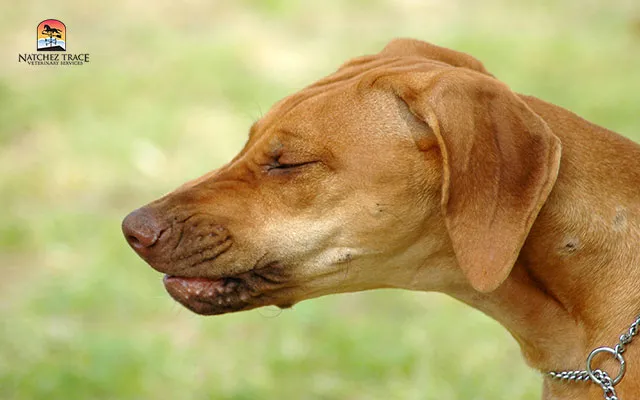 The symptoms of kennel cough include sneezing
The symptoms of kennel cough include sneezing
How Kennel Cough is Transmitted
Kennel cough is a highly contagious condition that spreads through various means. Understanding these transmission routes is vital for preventing outbreaks and protecting your dog.
The primary modes of transmission include:
- Direct Contact: Dogs can contract kennel cough through direct contact with an infected dog during play or in crowded environments like kennels and dog parks.
- Airborne Particles: The infection spreads via airborne droplets released when an infected dog coughs or sneezes, which can then be inhaled by nearby healthy dogs.
- Contaminated Surfaces: Shared items such as water bowls, food dishes, and kennel surfaces can harbor infectious agents, transmitting the infection to healthy dogs who come into contact with them.
 How kennel cough is transmitted through airborne particles
How kennel cough is transmitted through airborne particles
Kennel Cough Risk Factors
Several factors can increase a dog’s risk of contracting kennel cough. Being aware of these risks allows pet owners to take proactive steps to protect their companions.
Common risk factors include:
- Crowded Conditions: Environments where many dogs are housed together, such as boarding facilities, shelters, and dog parks, significantly increase the risk. Close proximity facilitates easy transmission of the infection.
- Stress: Stressful situations can weaken a dog’s immune system, making them more susceptible to infections like kennel cough. Stress can stem from environmental changes, routine disruptions, or exposure to unfamiliar dogs and situations.
- Young, Elderly, or Immunocompromised Dogs: Puppies, older dogs, and those with pre-existing health conditions are at higher risk for severe symptoms due to their weaker or developing immune systems.
Natural Remedies for Kennel Cough: At-Home Treatments
While mild cases of kennel cough often resolve on their own, natural remedies can significantly ease your dog’s symptoms and support their immune system during recovery. It’s crucial to monitor your dog closely and consult a veterinarian if symptoms worsen or persist.
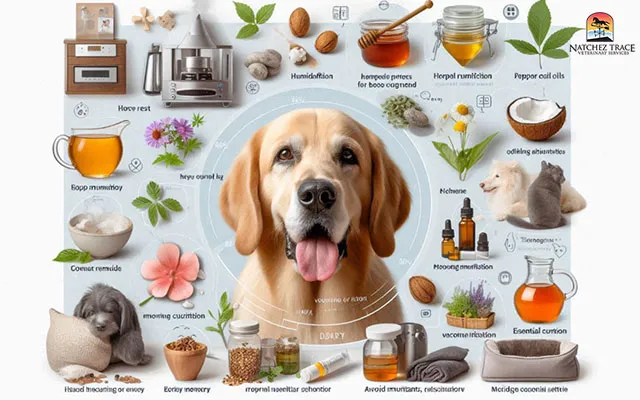 Kennel Cough Home Treatment for Dogs collage
Kennel Cough Home Treatment for Dogs collage
Here are some effective natural remedies for kennel cough:
Rest and Isolation
Rest is paramount for dogs battling kennel cough, allowing their immune system to focus its energy on fighting the infection. Provide your dog with a quiet, comfortable space where they can relax undisturbed. Adequate rest not only accelerates recovery but also minimizes the risk of complications.
Equally important is isolation to prevent the spread of kennel cough to other animals. Keep your infected dog separated from other pets and communal areas. This means avoiding dog parks, boarding facilities, and social gatherings until your dog has fully recovered. Prioritizing rest and strict isolation safeguards your dog’s health and that of other animals.
Hydration
Maintaining proper hydration is essential for a dog suffering from kennel cough. Water helps to thin mucus secretions, making it easier for your dog to clear their airways and breathe more comfortably. Encourage your dog to drink plenty of fresh water throughout the day.
To entice reluctant drinkers, consider offering low-sodium chicken or beef broth in addition to water. The savory flavor can make it more appealing, ensuring your dog receives the necessary fluids to stay hydrated and support their recovery. Proper hydration is a simple yet powerful natural remedy for kennel cough.
Humidification
Humidification can significantly alleviate your dog’s kennel cough symptoms. One highly effective method is steam therapy. Run a hot shower in your bathroom and allow your dog to sit in the steam-filled room for 10-15 minutes, ensuring they are supervised and comfortable. The warm, moist air soothes the throat and helps clear mucus from the airways, providing relief from coughing and discomfort.
Additionally, using a humidifier in the room where your dog sleeps can maintain a consistently moist environment, making it easier for them to breathe. Continuous exposure to moist air keeps respiratory passages hydrated, reducing irritation and promoting better respiratory health.
Honey
Honey serves as a wonderful soothing remedy for dogs with kennel cough. A small amount, typically 1/2 to 1 teaspoon depending on your dog’s size, can help coat and soothe their irritated throat, thereby reducing coughing. Honey’s natural properties provide immediate relief from irritation and help calm the persistent cough associated with kennel cough.
However, caution is paramount when using honey, especially with young dogs. Due to the risk of botulism, honey should not be given to puppies under one year old. Always ensure the honey is pure and free from additives.
Coconut Oil
Coconut oil is an excellent natural remedy for boosting your dog’s immune system, which is crucial when dealing with kennel cough. Adding a small amount to your dog’s food—about 1/2 teaspoon for small dogs and 1 teaspoon for larger dogs—can offer numerous health benefits.
Coconut oil contains antibacterial and antiviral properties that can help your dog’s body effectively fight off infections. The medium-chain triglycerides (MCTs) in coconut oil enhance immune function, promoting overall health and resilience against infections.
Herbal Remedies
Herbal remedies provide a natural and effective way to support your dog’s recovery from kennel cough. To prepare these remedies, purchase loose herbs and use 1 tablespoon of herb per 1 cup of water. You can prepare several cups of tea at once and store it in the refrigerator. When serving, mix the herbal tea into each meal: 1/4 cup for small dogs, 1/2 cup for medium dogs, 3/4 cup for large dogs, and 1 cup for dogs over 100 lbs.
- Licorice Root Tea: Licorice root is renowned for its anti-inflammatory and soothing properties, making it an excellent choice for easing throat irritation and reducing coughing.
- Thyme: Thyme offers both antibiotic and antiviral properties, helping to combat the infection while supporting overall immune health.
Essential Oils
Essential oils can be a supportive therapy for dogs with kennel cough, offering both topical and aromatic benefits. Always ensure essential oils are properly diluted and used safely to avoid adverse reactions. For reliable guidance, reference resources like “SpOIL Your Pet” by Mia Frezzo, DVM, a doTERRA veterinary panel member. Our clinic prefers doTERRA due to its strict quality control and veterinary panel, though other reputable brands like Young Living and AnimalEO are also used by vets. It’s crucial to use only top-quality, pure essential oils extracted without solvents.
- Topical Application: For topical treatment, dilute one (1) drop each of doTERRA Breathe, Frankincense, and Lavender essential oils in 2 teaspoons of carrier oil (like coconut or olive oil). Apply this diluted mixture 2-4 times daily by placing a few drops in your palms, rubbing them together, and gently “petting” it onto your dog’s head, neck, and chest, avoiding the eyes. This method can help soothe your dog’s respiratory system and provide calming effects.
- Aromatic Use: Diffusing essential oils in your dog’s environment also offers significant benefits. Use a diffuser with doTERRA On Guard, Breathe, and Frankincense essential oils for several hours during the day and night, especially in the area where your dog sleeps. This purifies the air, supports respiratory health, and creates a calming atmosphere.
Proper Nutrition
Proper nutrition is fundamental for strengthening your dog’s immune system and overall health, particularly during recovery from kennel cough.
- Nutritious Diet: A well-balanced, nutrient-rich diet with essential proteins, vitamins, and minerals is crucial for immune function.
- Soft Foods: If your dog has a sore throat, offer soft foods. You can soften kibble by soaking it in water or low-sodium broth, aiding swallowing and hydration.
- Home Cooking: Consider home-cooking meals for a tailored approach. Energetically appropriate diets, such as those recommended by Traditional Chinese Veterinary Medicine (TCVM), can provide an extra health advantage.
Avoid Irritants
Minimizing exposure to environmental irritants is essential to support recovery and reduce respiratory discomfort.
- Smoke and Strong Odors: Protect your dog from cigarette smoke, harsh cleaning products, and strong odors that can irritate their sensitive respiratory system, exacerbating coughing.
- Collar Pressure: Use a harness instead of a collar for walks or restraint. Collars can exert pressure on the throat, triggering coughing fits, whereas harnesses distribute pressure more evenly. You can also find home remedies for sneezing dog that might offer additional relief for respiratory discomforts.
Monitor and Consult
Closely monitoring your dog’s symptoms and consulting with your veterinarian are critical for managing kennel cough effectively. Note any changes in the frequency or severity of coughing, lethargy, appetite, or nasal discharge. If symptoms worsen or persist for over a week, seek veterinary attention promptly.
Always inform your veterinarian about any new herbs or supplements you are considering, especially if your dog has pre-existing conditions or is on medication. Your vet can provide guidance on safety, dosage, and potential interactions, ensuring they complement your dog’s treatment plan.
While these natural remedies for kennel cough can be highly beneficial, schedule an appointment if your dog shows severe symptoms such as difficulty breathing, severe lethargy, or complete loss of appetite. In such cases, your veterinarian might prescribe cough suppressants, antibiotics (if a bacterial infection is suspected), or anti-inflammatories.
How to Prevent Kennel Cough
Preventing kennel cough involves a multi-faceted approach combining vaccination, robust hygiene practices, and strategic management of your dog’s environment. Taking proactive steps can significantly reduce your dog’s risk of contracting this common respiratory infection.
Vaccination
The Bordetella bronchiseptica vaccine is the most common vaccine for preventing kennel cough, available as an injectable, intranasal, or oral vaccine. While many boarding facilities require this vaccine, some veterinarians, like Dr. Marc Smith, believe its efficacy can be limited and may not recommend it as a standard practice for all dogs. Always discuss the best vaccination approach for your dog with your veterinarian.
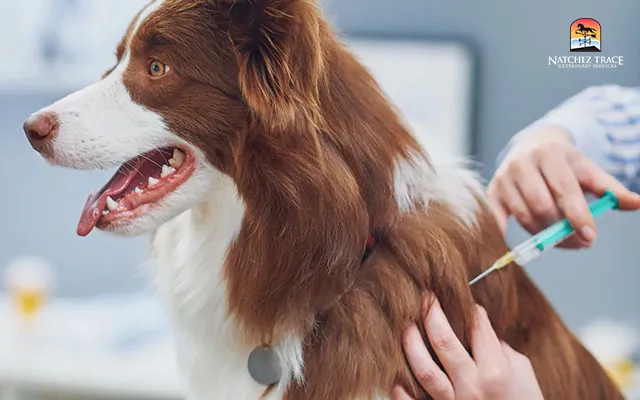 Vaccines for preventing kennel cough
Vaccines for preventing kennel cough
Hygiene and Sanitation
Regularly clean and disinfect your dog’s living area, including bedding, toys, and feeding bowls, to reduce the presence of infectious agents. Maintaining a clean environment is fundamental in minimizing the risk of kennel cough.
Avoid Crowded Places
Limit your dog’s exposure to crowded environments such as dog parks, boarding kennels, and grooming salons, particularly during known outbreaks. These areas are hotspots for the rapid spread of infection.
Manage Social Interactions
Managing your dog’s social interactions is crucial for preventing the spread of contagious diseases. Screen dogs your pet interacts with to ensure they are healthy and vaccinated, especially in settings like doggy daycare or training classes. When introducing a new pet, quarantine them from existing pets until you confirm they are free from respiratory infections.
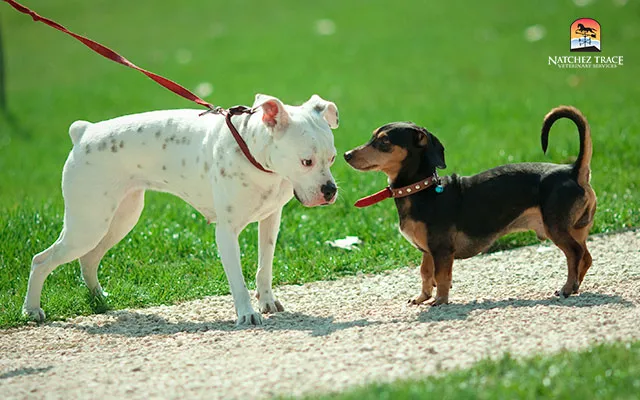 Manage social interactions to prevent kennel cough
Manage social interactions to prevent kennel cough
Boost Your Dog’s Immune System
A strong immune system is your dog’s best defense against kennel cough. Maintaining immune health through proper nutrition, regular exercise, and stress reduction helps your dog resist infections and recover more quickly if exposed. Supplements like PET | TAO Complement Immune, an all-natural blend with medicinal mushrooms and antioxidants, can further enhance immune function.
Healthy Diet
Feeding your dog a well-balanced, nutritious diet is paramount for immune support. Consider a Traditional Chinese Veterinary Medicine (TCVM) energetically appropriate diet for proactive health management. These diets, including recipes available on dedicated food therapy pages, can significantly boost your dog’s immune system and help manage chronic conditions. High-quality mushroom supplements like Complement Immune can also fortify immune defenses.
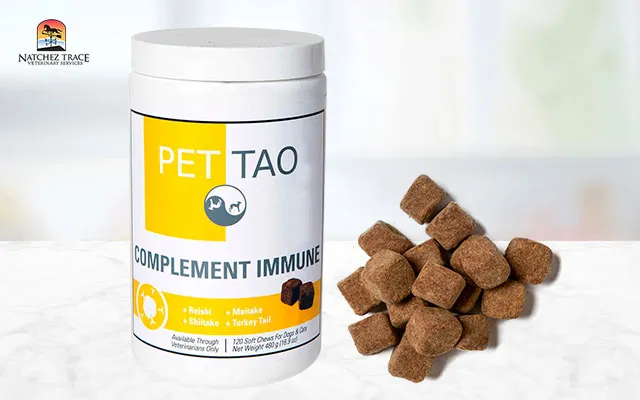 PET | TAO Complement Immune, immune booster for dogs, helps kennel cough
PET | TAO Complement Immune, immune booster for dogs, helps kennel cough
Regular Exercise
Regular exercise plays a vital role in boosting your dog’s immune function by stimulating the production of immune cells and improving circulation. Physical activity also reduces stress levels by promoting endorphin release, directly linking to a stronger immune system.
Reduce Stress
Minimizing stress is crucial for a robust immune system. Chronic stress releases cortisol, which can suppress immune responses, making dogs more susceptible to infections. Create a calm, predictable environment with plenty of mental and physical stimulation. Establish consistent routines, provide a safe retreat, and consider positive reinforcement training or calming aids.
Ventilation
Ensuring good ventilation in your dog’s environment is essential. Adequate airflow dilutes and disperses airborne pathogens, including those causing kennel cough, minimizing infection risk in indoor facilities. Good ventilation also maintains optimal air quality, preventing respiratory issues.
 Good ventilation for treating kennel cough in dogs
Good ventilation for treating kennel cough in dogs
Avoid Shared Items
Avoiding shared items like water bowls, toys, and bedding is crucial to prevent the spread of infections. Pathogens can easily transmit through saliva and nasal secretions on contaminated surfaces. Provide your dog with designated items, especially in public places, and regularly clean and disinfect their belongings.
Regular Veterinary Check-Ups
Regular veterinary check-ups monitor your dog’s health, ensuring they are up-to-date on vaccinations and preventive care. Early detection of health issues, including topics like heartworm medicine for dogs, can significantly improve treatment outcomes.
Prompt Treatment
If your dog shows any signs of respiratory illness, seek veterinary care promptly. Early intervention can prevent the spread of infection and reduce the severity of the illness.
By diligently following these preventive measures, you can significantly reduce your dog’s risk of contracting kennel cough and ensure their overall health and well-being.
Conclusion
Navigating kennel cough requires a blend of vigilance, understanding, and proactive care. While it can be a concerning diagnosis for any dog owner, many effective natural remedies for kennel cough can provide comfort and support during your dog’s recovery. From ensuring adequate rest and hydration to exploring the benefits of humidification, honey, coconut oil, and carefully selected herbal and essential oil therapies, these at-home approaches empower you to play an active role in your pet’s healing process. Coupled with proper nutrition, avoiding irritants, and diligent monitoring, these natural strategies form a comprehensive care plan. Remember, however, that persistent or worsening symptoms warrant prompt veterinary consultation. Prioritizing prevention through vaccination, hygiene, managing social interactions, and boosting immune health ensures your beloved companion remains happy and healthy. By combining natural remedies with professional veterinary advice, you’re well-equipped to manage and prevent kennel cough effectively.
